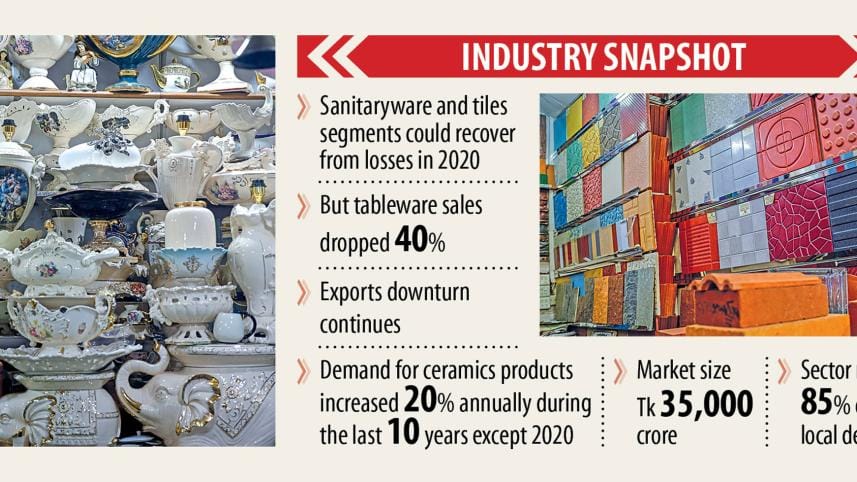Local demand saves the day for ceramics makers

The local market has emerged as a saviour for ceramics makers as the recovery in construction activities pushed up demand, helping manufacturers make a turnaround from the pandemic-induced losses amid a consistent fall in exports.
The relief came in the last three months of 2020 after domestic sales rebounded, allowing them to recover from the loss incurred in the initial months of the countrywide lockdown.
"The sector started to pick up from June after the demand for sanitary and tile items from the housing and construction sectors rose," said Abu Jubaid Mohammad Rassel, senior marketing manager at Akij Ceramics.
MA Jabbar, managing director of DBL Ceramics, said the business scenario might have improved but it was yet to regain its previous momentum and therefore, uncertainty remains.
"The year that just ended was a challenging one not just for the ceramic industry, but for the whole world," he added.
Ceramic manufacturers in Bangladesh mainly produce three types of product: tiles, tableware and sanitary ware.
Of the 68 ceramic manufacturers currently operating, 20 produce tableware, 32 make tiles, and the rest 16 produce sanitary ware.
The sanitary ware and tiles segments made a turnaround in July to October and reached the pre-pandemic level.
"The sanitary ware segment is necessary as household items, and there is no way to avoid replacement and installation," Rassel said.
An additional 10 per cent customs duty on the import of foreign tiles and sanitary wares that was slapped this fiscal year helped the sector recover immediately, he said.
Not all manufacturers resumed operations just after the partial lifting of the lockdown in June.
"Those who showed courage and resumed operations were gainers," he added.
Ceramic exports, however, did not fare well even before the pandemic.
In the last fiscal year, ceramic exports dipped 59 per cent year-on-year to $28 million, data from the Export Promotion Bureau (EPB) showed.
Ceramic exports fell 16 per cent year-on-year to $15 million in the July-December period of the current fiscal year.
Ceramics were exported to more than 50 destinations, including the US, the UK, Canada and a few EU and Latin American countries.
"It will take until at least March for things to return to normalcy. Then export orders and domestic demand will go up," said Irfan Uddin, general secretary of the Bangladesh Ceramic Manufacturers and Exporters Association (BCMEA).
The tableware segment witnessed at least 40 per cent business fall in 2020 as demand fell in both domestic and international markets.
Customers treated tableware as luxury items, so business was slow. The corporate order in 2020 was almost zero, he said.
The managing director of FARR Ceramics said the ceramics industry would face challenges in the coming months as consumers tend to avoid purchasing luxury items amid the pandemic.
Muhammad Shahidul Islam, company secretary of RAK Ceramics (Bangladesh), said the company achieved 80 per cent of the sales target set for 2020.
"Businesses are yet to return to the pre-pandemic stage despite the uptick in sales," said Avenue Sangma, brand manager of Tilottoma Bangla Group, the sole distributor of Toto, a high-end Japanese sanitary ware producer.
The group, which caters to largely the high-income groups, recovered about 75 per cent of its business at the end of 2020.
"Last year's sales helped us survive," he said, adding that sales may improve in 2021.
Several reputed real estate developers that source products from Tilottoma are yet to resume to place bulk orders as they did in the past, Sangma said.
According to the BCMEA, the market for ceramic products was valued at around Tk 35,000 crore in 2019.
The industry's production capacity has grown by 200 per cent in the last 12 years and Bangladesh currently holds 0.14 per cent of the global market for ceramic products.
Local suppliers cater to 85 per cent of the domestic demand. The industry employs about five lakh workers, of which two lakh are women.
Manufacturers produced more than 25 crore pieces of tableware, 15 crore square metres of tiles and 1.20 crore pieces of sanitary ware in 2019. Some 25 lakh pieces of sanitary ware were imported in the year.
DBL Ceramics Managing Director Jabbar is optimistic about 2021 but does not see an immediate return to the sales that were registered in the past.
"Businesses will need to find out innovative ways to recover losses. They need more business-friendly policies from the government," the entrepreneur said.




 For all latest news, follow The Daily Star's Google News channel.
For all latest news, follow The Daily Star's Google News channel.
Comments